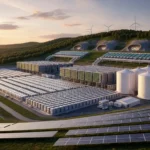Data center equipment forms the backbone of modern digital infrastructure, serving as the nerve center for storing, processing, and distributing vast data. From servers and storage systems to networking devices and cooling infrastructure, data center equipment is critical in supporting the ever-growing demands of cloud computing, big data analytics, and digital services. In this opinion piece, we will explore the significance of data center equipment and its impact on digital ecosystems’ reliability, performance, and scalability.
Driving Innovation and Scalability
Data center equipment enables organizations to innovate and scale their digital operations by providing robust and scalable infrastructure for storing and processing data. Advances in server technology, such as developing high-density racks and powerful processors, have allowed data centers to handle increasingly complex workloads with greater efficiency and agility. Additionally, innovations in storage systems, networking equipment, and cooling technologies have further enhanced the performance and reliability of data center infrastructure, enabling organizations to meet the growing demands of digital transformation.
Ensuring Reliability and Availability
Reliability and availability are paramount in data center operations, as downtime can result in significant financial losses and damage to reputation. Data center equipment is designed to ensure uninterrupted operation and maximum uptime, with redundant power supplies, backup generators, and failover mechanisms to mitigate the impact of hardware failures or power outages. Additionally, sophisticated monitoring and management tools allow data center operators to proactively identify and address potential issues before they escalate into service disruptions, ensuring continuous availability of digital services.
Optimizing Energy Efficiency
Given the significant energy consumption associated with cooling and powering large-scale infrastructure, energy efficiency is a key consideration in data center design and operation. Data center equipment incorporates various technologies and strategies to optimize energy efficiency, including advanced cooling systems, virtualization techniques, and hardware consolidation. By reducing energy consumption and minimizing carbon footprint, data center operators can lower operating costs and environmental impact while ensuring sustainable growth and compliance with regulatory requirements.
Embracing Modular and Flexible Designs
As digital workloads evolve and diversify, data center equipment embraces modular and flexible designs to accommodate changing requirements and enable rapid deployment of new services. Modular data center architectures, such as containerized and prefabricated modules, offer scalability and agility, allowing organizations to scale up or down as demand fluctuates quickly. Moreover, software-defined technologies, such as software-defined networking (SDN) and software-defined storage (SDS), enable greater flexibility and automation in managing and provisioning data center resources.
Conclusion
Data center equipment is critical in powering the digital infrastructure that underpins modern society and business operations. By driving innovation, ensuring reliability, optimizing energy efficiency, and embracing modular designs, data center equipment enables organizations to meet the growing demands of digital transformation while maintaining high performance, scalability, and availability levels. As the digital landscape continues to evolve, data center equipment will remain essential in supporting the relentless pace of technological advancement and driving the digital economy forward.





